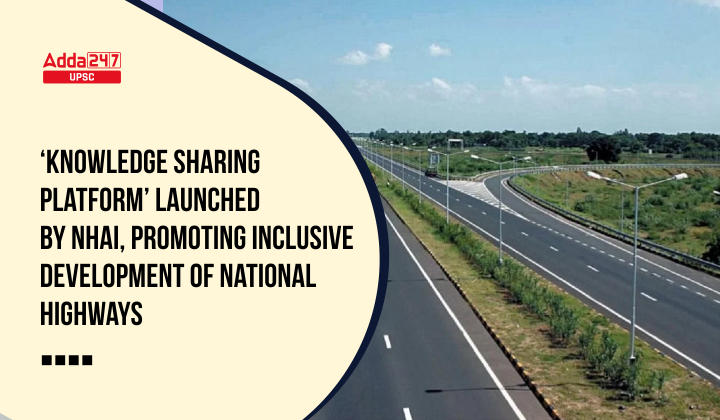Table of Contents
NHAI’s Knowledge Sharing Platform: The ‘Knowledge Sharing Platform’ by NHAI serves as a valuable resource for experts and individuals interested in contributing their knowledge and insights on various topics related to road design, construction, road safety, environmental sustainability, and more. By encouraging the sharing of best practices from around the world, this initiative aims to contribute to the comprehensive development of the National Highway infrastructure in India. NHAI’s Knowledge Sharing Platform is also important for UPSC Prelims Exam and UPSC Mains Exam (GS Paper 3- Environment and Ecology, Various Sustainable initiatives taken by government bodies).
Knowledge Sharing Platform by NHAI in News
Recently, National Highways Authority of India (NHAI) has introduced a new ‘Knowledge Sharing’ platform aimed at facilitating the exchange of knowledge and innovative best practices. ‘Knowledge Sharing Platform’ is hosted on the NHAI website.
NHAI’s Knowledge Sharing Platform Details
NHAI’s ‘Knowledge Sharing Platform’ provides an opportunity for the authority to engage with experts and individuals interested in sharing their knowledge and insights on various topics including road design, construction, road safety, environmental sustainability, and related areas.
- Mandate: By encouraging the sharing of best practices from across the globe, this initiative aims to contribute to the comprehensive development of the National Highway infrastructure in India.
- Promoting Collaborative Approach: Through collaboration and knowledge dissemination, NHAI strives to enhance the quality and effectiveness of its projects and promote continuous improvement in the field of highway development.
- Dissemination of Best Practices: The NHAI web portal allows the uploading of best practices in various formats such as video clips, PowerPoint presentations, and PDF files.
NHAI’s Knowledge Sharing Platform Significance
This platform serves as a repository for sharing valuable insights and knowledge. NHAI officials will carefully review the uploaded information and evaluate its suitability for implementation.
- By leveraging this platform, NHAI aims to foster a collaborative environment that promotes the adoption of effective practices and contributes to the continuous improvement of the National Highway infrastructure in India.
- The platform of ‘Knowledge Sharing’ serves as a means to enhance engagement and collaboration among experts and citizens.
- It provides an opportunity for individuals to contribute their ideas, best practices, and thoughts, thereby playing a significant role in the process of nation-building.
Sustainable and Eco-Friendly Practices by NHAI
The National Highways Authority of India (NHAI) is promoting various Sustainable and Eco-Friendly Practices in development of road Infrastructure in India. Few of them are discussed below-
- Utilizing advanced technology and embracing rapid innovation, the national highway infrastructure is undergoing rapid development.
- The National Highways Authority of India (NHAI) is actively promoting sustainable and environmentally friendly practices by incorporating recycled materials such as plastic waste and fly ash. Furthermore, the use of Recycled Asphalt (RAP) and Recycled Aggregates (RA) is being encouraged to contribute towards a greener environment.
- In order to keep pace with the changing times, it is imperative for the national highway infrastructure to continuously evolve and progress.
- This involves the construction of state-of-the-art tunnels, implementation of wildlife corridors, development of modern bridges, and expansion of motorways.
- Active involvement and participation are crucial to ensure the continual advancement of the highway infrastructure.
About National Highways Authority of India (NHAI)
National Highways Authority of India (NHAI) is a premier government organization that plays a pivotal role in the development, management, and maintenance of national highways in India. With a focus on innovation, sustainability, and efficiency, NHAI has been instrumental in transforming the country’s road infrastructure and improving connectivity for its citizens.
- NHAI was established through an Act of Parliament in 1988 and operates under the administrative control of the Ministry of Road Transport and Highways. Although NHAI was established in 1988, it began functioning effectively in February 1995.
- Its primary mandate is to develop, maintain, and manage the National Highways assigned to it by the Government of India.
- The Authority comprises a full-time Chairman, along with not more than five full-time Members and four part-time Members, who are appointed by the Central Government.
- The part-time Members include the Secretary (RT&H), Secretary (Expenditure), Secretary (Planning), and DG (RD) & SS.
- At its headquarters, NHAI has various wings such as Technical, Finance, Administrative, and Vigilance, which work together to support its operations.
- To ensure the timely completion of projects, NHAI has established Project Implementation Units (PIUs) at different locations.
- These PIUs are led by a Project Director and are staffed with technical and accounts officers.
- The purpose of these units is to oversee the implementation of projects and ensure their successful completion within the specified timelines.
Sustainable Mountain Development Summit (SMDS) 2022
| Follow US |
| UPSC Govt Jobs UPSC Current Affairs UPSC Judiciary PCS Download Adda 247 App here to get the latest updates |



 TSPSC Group 1 Question Paper 2024, Downl...
TSPSC Group 1 Question Paper 2024, Downl...
 TSPSC Group 1 Answer key 2024 Out, Downl...
TSPSC Group 1 Answer key 2024 Out, Downl...
 UPSC Prelims 2024 Question Paper, Downlo...
UPSC Prelims 2024 Question Paper, Downlo...




